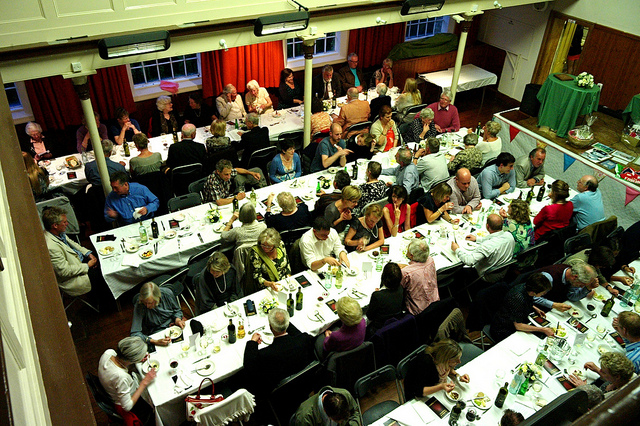Fair use and the Joyce Estate
“When I proposed a James Joyce biography to my publisher, I was aware that the deadliest booby trap on the road ahead was the Joyce estate’s explosive trustee, Stephen James Joyce, the author’s grandson.”
Yesterday was Bloomsday — the first Bloomsday in which Ulysses is in the public domain. The Daily Beast celebrated by publishing a nice piece by Gordon Bowker, the great man’s latest biographer in which he recounts what it was like working under the shadow of legal threats from Stephen Joyce, James’s grandson and controller of his literary estate. The piece also has a lovely photograph of Joyce with his infant grandson. Worth reading in full.
Missing in action
This blog went missing yesterday, for reasons that were entirely ridiculous, not to say predictable: it was moved to a different server. My web-hosting service had, of course, alerted me well in advance that this would happen but — well, you can guess the rest: the email got swamped in the tide that floods my inbox and…
After I’d reset the DNS pointers, it took 24 hours for the change to ripple through. If you’re a regular reader, please accept my apologies. As usual, incompetence rather than conspiracy provides the best explanation.
Flaming hell: we need a new security paradigm
This morning’s Observer column about the implications of the Flame virus.
The PC security business does offer a degree of protection from the evils of malware, but suffers from one structural problem: its products are, by definition, reactive. When a particular piece of malicious software appears, it is analysed in order to determine its distinctive “signature”, which will enable it to be detected when it arrives at your machine. Then a remedy is devised and an update or “patch” issued – which is why your PC is forever inviting you to download updates – and why IT support people always look pityingly at you when you explain sheepishly that you failed to perform the aforementioned downloads.
So the security companies are always playing catch-up, profitably slamming stable doors after the horses have bolted. Until recently, the industry has tactfully refrained from emphasising this point, and most of its customers have been too clueless to notice.
This cosy arrangement was too good to last, and a few weeks ago the industry’s cover was finally blown…
Grace under pressure
No, not a picture of a Jubilee dinner, but of something far more moving and significant. Some months ago, a lovely young man who was a classmate of my daughter at secondary school — a clever, charming, athletic undergraduate — had a terrible accident while on a sporting trip abroad. He fell from an hotel balcony and suffered horrendous head injuries. When they got him to hospital, the medics thought he would die. He was in a coma for weeks, had emergency brain surgery and was eventually flown home to our local hospital where he is beginning to make a slow — but in the circumstances miraculous — recovery. He has a wonderful, supportive family but they’re not rich, and this catastrophe has obviously stretched their resources, so many of us have been wondering how best we can help.
Then two of their closest friends had an idea. Why not organise a “benefit evening”? So they set about it. A dinner in the village hall, cooked by volunteers, with everyone paying a lot more than they would in a restaurant. And an ”auction of promises” afterwards.
So last evening we drove through what VS Pritchett once called ”the most gardened country on earth” to the village hall. It was the kind of beautiful English summer evening that George Orwell (and John Major) would have recognised. The only thing missing was those old maids cycling to Evensong. When we got to the Hall, we were directed efficiently into a field specially set aside for parking. Our stewards were young men — some of whom I recognised from the primary-school gate when I used to meet their parents as I picked up my own children. Then into the Hall, which was packed to the rafters. Long trestle-tables with white linen, glasses and cutlery. Legions of the injured boy’s classmates recruited as waiters and dressed neatly in black trousers and white shirts. Guests of all ages, including many grandparents — and villagers who hadn’t known either the boy or his family but felt moved to put their personal weight behind this gesture of solidarity. Lots of parents I hadn’t met for years. Introductions which went, ”Hello, I’m JP’s Mum. You must be Annie’s Dad”. Teachers from the (terrific) school that so many of our children had attended. And the injured boy’s twin brother.
Then the meal: excellent boeuf bourgignon for the carnivores; and an equally delicious vegetarian option. And lots of dessert, with each table taking its turn to collect it. All in good order and with much cheerful jostling. Afterwards a few short speeches: from the boys’ rugby coach; then the sparky teacher who taught our children English for GCSE; and finally the injured lad’s identical twin.
”Some of you won’t know my brother”, he said, ”but now you do, because usually people cannot tell us apart”. He spoke movingly but without mawkish sentimentality, and left us marvelling at the capacity of human beings to rise above adversity. He and his brother are as close as it possible for two people to be; so in a way part of him was down the road in hospital as he spoke. Listening to him I felt that, for once, Hemingway’s definition of courage as ”grace under pressure” was justified.
And then the auction of promises. People had come up with an amazing array of offerings. Numerous tickets to rugby Internationals (for sums ranging between £120 and £280); a round of golf with the school principal (£120). Tickets to cricket Test Matches. Paintings by local artists. A week in an Alpine chalet (£1200). Another week in a Portuguese villa. A meal for two in a local restaurant (we went to £100 on this and were outbid). A free annual tax return by a local accountant (a snip at £35). And so it went on and on, with the audience being continually amazed — and delighted — by the frenzied bidding.
What fuelled the event was a shared recognition of how fragile is the thread by which life hangs. Here, after all, was a family which had done everything right: brought up two lovely lads who had the world at their feet — boys who turned out to be not only nice people and terrific athletes but also had won places at Oxford. And then — bang! — in one fateful moment, it all disintegrated. They had experienced the terror that lurks at the back of every parent’s mind. There but for the Grace of God and all that…
It was one of the most heart-warming events I’ve ever attended, an affirmation of the power of friendship and human empathy, a reminder — against the horrifying evidence of our capacity for inhumanity that is currently on display in Syria — of the better angels of our nature. And it was all so very English, somehow: no histrionics; no tears; just a quiet, determined pragmatism. As we drove home in the dark I was reminded of why I love living in this country.
Stuxnet, Obama and the necessary hypocrisy of statecraft
This morning’s Observer column.
When Stuxnet was first discovered in 2010, it attracted a great deal of attention for several reasons. For one thing it was so remarkably sophisticated and complex that its creation would have required a large software team. This led many of us to suppose that it must be the work of the security services of a major industrial country: it was hard to imagine run-of-the-mill malware authors going to all that trouble when they could be harvesting stolen credit-card numbers without getting out of bed. But the most intriguing thing about Stuxnet was the way it targeted a very specific piece of equipment: the Siemens Simatic programmable logic controller. It is commonplace in industrial operations everywhere – oil refineries, chemical plants, water-treatment facilities and so on. And it is also the device that controlled the centrifuges of the Iranian nuclear programme. Stuxnet could – and did – instruct the Siemens controller to cause the centrifuges to accelerate until they disintegrated.
All this pointed toward one conclusion – that Stuxnet must have been the creation of either the US or Israel. But no one knew for sure. Now, thanks to some fine investigative reporting by David Sanger, we do. The Stuxnet project – codenamed “Olympic Games” – was actually started by the Bush administration and accelerated by Obama in his first months in office. What’s more, Sanger claims that Obama took a detailed, personal interest in the progress of the Stuxnet attack and that there were some agonised discussions in the White House when it was realised that the worm, instead of remaining inside the Natanz nuclear plant, had escaped into the wild, as it were…
Clang!
I’m not a games geek (nor a swordsman either), but I might just pledge some money for this, partly because I admire Neal Stephenson (remember his wonderful essay, “In the Beginning Was the Command Line”?) and partly because this is a clever, beautifully-executed video too. Thanks to Neil Davidson for the link.
Kickstarter page here.
Last of the Mohicans
Just in case you’re feeling swamped…
Here’s the first page (of five) of Thomas Edison’s To-Do list for January 3, 1888.
Hmmm… Wonder what David Allen would have made of it. Edison breaks all the rules of his system.
From the Edison Papers at Rutgers University. Thanks to Brain Pickings for spotting it.
Quote of the Day: When bubbles burst…
“There’s always an upside. When stocks go down, bonds go up. When any hamster-based startup can raise $50 million on a $1 billion market cap, there’s not much market for new ideas. Why bother, when the same-old-stuff can make you rich. But when the bubble fades, it’s time to get creative. Because tech will reboot. The question is, what’s the next wave.”





